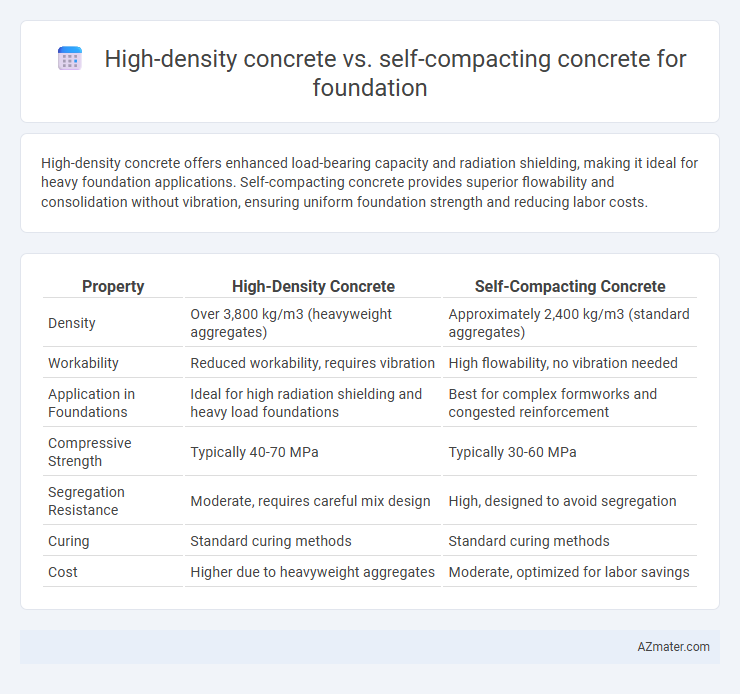High-density concrete offers enhanced load-bearing capacity and radiation shielding, making it ideal for heavy foundation applications. Self-compacting concrete provides superior flowability and consolidation without vibration, ensuring uniform foundation strength and reducing labor costs.
Table of Comparison
| Property | High-Density Concrete | Self-Compacting Concrete |
|---|---|---|
| Density | Over 3,800 kg/m3 (heavyweight aggregates) | Approximately 2,400 kg/m3 (standard aggregates) |
| Workability | Reduced workability, requires vibration | High flowability, no vibration needed |
| Application in Foundations | Ideal for high radiation shielding and heavy load foundations | Best for complex formworks and congested reinforcement |
| Compressive Strength | Typically 40-70 MPa | Typically 30-60 MPa |
| Segregation Resistance | Moderate, requires careful mix design | High, designed to avoid segregation |
| Curing | Standard curing methods | Standard curing methods |
| Cost | Higher due to heavyweight aggregates | Moderate, optimized for labor savings |
Introduction to Foundation Concrete Types
High-density concrete provides enhanced radiation shielding and increased compressive strength, making it ideal for foundations in nuclear facilities and heavy-load structures. Self-compacting concrete offers superior flowability and compaction without mechanical vibration, improving efficiency and quality for complex foundation forms. Selecting between these types depends on project-specific requirements such as load capacity, environmental factors, and construction logistics.
What is High-Density Concrete?
High-density concrete is a specialized type of concrete that incorporates heavy natural or artificial aggregates such as barite, magnetite, or hematite, resulting in a density ranging from 3000 to 4800 kg/m3, significantly higher than normal concrete. This increased density enhances radiation shielding, structural stability, and durability, making it ideal for foundations in nuclear plants, medical facilities, and heavy equipment bases. Compared to self-compacting concrete, high-density concrete is optimized for high mass and specific engineering properties rather than ease of placement and flow characteristics.
Understanding Self-Compacting Concrete
Self-compacting concrete (SCC) offers superior flowability and eliminates the need for mechanical vibration, ensuring uniform compaction in complex foundation forms and dense reinforcement areas. The high fluidity of SCC enhances productivity and reduces labor costs while maintaining high strength and durability similar to high-density concrete. Unlike traditional high-density concrete, SCC improves structural integrity by minimizing voids and segregation, making it ideal for foundations requiring precise placement and dense reinforcement.
Key Properties Comparison
High-density concrete boasts superior density and compressive strength, making it ideal for foundations requiring enhanced load-bearing capacity and radiation shielding. Self-compacting concrete offers exceptional flowability and segregation resistance, facilitating easier placement and reduced labor on complex foundation forms. Key properties such as unit weight, workability, and compressive strength distinctly differentiate high-density concrete (typically 3,800-4,800 kg/m3, 50-80 MPa) from self-compacting concrete (around 2,300-2,500 kg/m3, 30-60 MPa), influencing their suitability for specific foundation applications.
Strength and Durability Analysis
High-density concrete, characterized by its heavy aggregates such as barite or magnetite, delivers superior strength and durability for foundation applications by providing enhanced compressive strength and resistance to radiation and chemical attacks. Self-compacting concrete offers excellent flowability and uniformity, reducing voids and improving overall durability while maintaining adequate strength for foundation structures. Comparative analysis indicates high-density concrete excels in high-load and radiation-shielding requirements, whereas self-compacting concrete optimizes construction efficiency and durability in complex formworks.
Workability and Placement Methods
High-density concrete offers superior load-bearing capacity for foundations but requires mechanical vibration for proper compaction due to its low workability. Self-compacting concrete (SCC) features high flowability and can fill complex formwork without vibration, enhancing placement efficiency and reducing labor costs. The choice between these concretes depends on balancing structural weight demands with ease of placement and site constraints.
Suitability for Different Foundation Types
High-density concrete, known for its superior weight and radiation shielding properties, is ideal for foundation types requiring high load-bearing capacity such as nuclear power plants and heavy machinery bases. Self-compacting concrete offers excellent flowability and vibration-free placement, making it suitable for complex foundation shapes or densely reinforced areas like bridge piers and high-rise building foundations. Selecting between these concretes depends on specific foundation requirements including load intensity, reinforcement density, and construction constraints.
Cost and Material Considerations
High-density concrete typically costs more due to its use of heavy aggregates like barite or magnetite, which increase material expenses but enhance radiation shielding and structural mass for foundation applications. Self-compacting concrete, with its optimized mix design incorporating superplasticizers and fine powders, reduces labor costs by eliminating vibration and enables faster placement, though raw material costs can vary based on admixture types. Choosing between the two depends on budget constraints, required structural properties, and the need for specialized performance such as high density versus ease of placement.
Environmental Impact and Sustainability
High-density concrete incorporates heavy aggregates that increase durability and radiation shielding but often results in higher embodied energy and carbon emissions due to mining and transportation of dense materials. Self-compacting concrete (SCC) utilizes fine particles and chemical admixtures to improve flowability without vibration, reducing labor and noise pollution while allowing optimized mix designs for lower cement content and enhanced sustainability. Selecting SCC for foundations can decrease environmental impact by minimizing resource consumption and improving energy efficiency during construction compared to traditional high-density concrete.
Conclusion: Choosing the Right Concrete for Foundations
High-density concrete offers exceptional radiation shielding and durability, making it ideal for specialized foundation applications such as nuclear facilities. Self-compacting concrete provides superior flowability and uniform compaction without mechanical vibration, ensuring high-quality foundations in complex formworks or congested reinforcement areas. Selecting the right concrete depends on specific project requirements like load-bearing capacity, environmental exposure, and construction conditions, with high-density concrete suited for heavy-duty protection and self-compacting concrete optimized for efficient placement and structural integrity.

Infographic: High-density concrete vs Self-compacting concrete for Foundation
 azmater.com
azmater.com